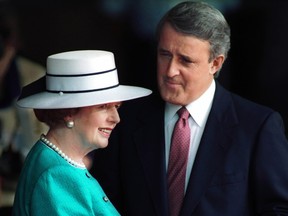I had a ringside seat to the 1987 Vancouver Commonwealth summit in which the two leaders went toe-to-toe over the issue. Mulroney quickly became my favourite politician.
Article content
In the heady days of the anti-apartheid struggle in the 1980s, the “West,” embodied by British Prime Minister Margaret Thatcher and U.S. President Ronald Reagan, was the “enemy” that stood in the way of freedom for South Africa.
The antipathy towards the West by most young activists on university campuses and elsewhere came from western support for the oppressive regime of President P.W. Botha, whom Thatcher provocatively invited to the United Kingdom in 1984. And among us young activists at the time, we could not understand how the “freedom-loving” West didn’t support the African National Congress’ (ANC) fight for liberation in the face of everything South African Blacks were being subjected to.
Advertisement 2
Article content
Article content
And then, out of nowhere in 1984, Brian Mulroney burst onto the scene and began to change the narrative. And by the time of the 1987 Commonwealth Heads of Government meeting in Vancouver, he had become my favourite politician.
During the dark years of apartheid, Canada did not have much of anything resembling a strong anti-apartheid policy and for that reason, most people, including the activists and African journalists immersed in the issue, were curious about Mulroney, their new Western ally. They didn’t really know him, but his cracking anti-apartheid speech at the United Nations in 1985 warmed their hearts. Here was a new voice against apartheid, not just any voice but one from a G7 country, and powerful enough to stand up to Thatcher, who until that time, had the stage all to herself.
It wasn’t that there were no anti-apartheid voices then. Indian prime minister Rajiv Gandhi, Australian prime minister Bob Hawke and Zambia’s president, Kenneth Kaunda, were among many who spoke out, but their voices didn’t carry enough weight. Mulroney’s did, and now, everywhere Thatcher spoke, Mulroney would be there to respond.
Advertisement 3
Article content
The big issue about apartheid in the 1980s was sanctions against South Africa, which Thatcher opposed, and Mulroney supported, setting the stage for their constant clashes, which came to a head at the Vancouver summit. By this time, I was in the U.K. working for African Concord, one of the many African magazines that flourished in London. In spite of Thatcher, London was a hotbed of anti-apartheid activity, with many ANC leaders, including ANC president Oliver Tambo, living there. I got to know some of them.
And so it was that I was tapped to cover the 1987 summit, and off I was to Vancouver for my first and only visit to the city. Apartheid was the big issue and sanctions against the South African regime laid bare the deep divisions in the Commonwealth; the leaders were constantly exchanging verbal missiles with Thatcher. It was really Thatcher against the rest, led by host Mulroney. Thatcher was combative and condescending, but watching Mulroney go toe-to-toe with her on an issue that was so dear to Africans and many others was endearing.
Mulroney felt strongly that apartheid was immoral and repugnant, and made that very clear in his public statements as he argued forcefully for sanctions. Of course, Thatcher was the strongest force in the Commonwealth, boasting at one moment that “it would not be the Commonwealth without Britain,” and she got her way. The final summit statement was weak, and did not include any new sanctions against South Africa.
Advertisement 4
Article content
Still, Vancouver showed the extent of Thatcher’s isolation, and even though she didn’t care, it was clear that she was swimming against the tide. Time would soon prove Mulroney right, and by 1990, Nelson Mandela was out of prison. Not long after, he became president. Ironically, Thatcher would be pushed out of office the same year.
I didn’t know until I was in Canada that Mulroney was a Conservative politician, who actually admired Thatcher and Reagan. It didn’t fit. But clearly, Mulroney was a different Conservative, and I came away from the summit holding him in high esteem for his principled stand on apartheid. Some of us will remember him fondly for his contribution to freedom in South Africa.
Ottawa’s Mohammed Adam is a journalist and commentator. Reach him at [email protected]
Recommended from Editorial
-

Adam: Ontario’s plan to increase the supply of family doctors isn’t working
-

Adam: Do Ottawa police have a double standard about protests? It sure looks like it
Article content




